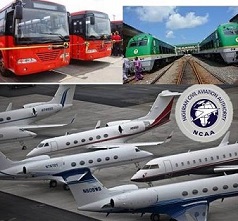Transportation- President’s priorities:

Sector’s 1.41% contributions to GDP unacceptable:
The present administration was speaking through the Minister of Transportation when it said: “The contribution of the transport sector to the Gross National Product is an unacceptable at 1.41%. For a sector that plays a major role in the nation’s development, there is an urgent need to exploit the opportunities that abound within the sector to improve its contribution to the national economy.”
“Although Nigeria is blessed with multiple modes of transportation that is the envy of many, these potentials have largely remained untapped.” This is why the Ministers in charge of the transportation sector declared that: “We can, like South Korea and Singapore, build our economies around a vibrant transportation sector.”
Regarding the nation’s air and rail transportation, the Ministers had this to say:“Our air transport and railways sub-sectors hold the key to unlocking the vast potentials in our cities and rural areas.”ChibuikeAmechi, the Minister of Transportation was to say: “I am impressed by what we have seen. When people express dissatisfaction with the airport they are looking at the terminal only, but there are a lot of things that have been achieved to make aircraft fly safely.” There is a fine mix of modern technology and human expertise by the aviation agencies and private sector operators.
FG determined to fully exploit the potentials in the transportation sector with a view to enhancing national integration:
It was from the tours to assess the sub sectors of transportation and aviation that the policy thrust of the present administration evolved: “The Buhari administration is determined to fully exploit the potentials in the transportation sector with a view to enhancing national integration by encouraging mass transit of passengers and goods between and across the geographical regions of the country.”
The milestones were clear: safety is priority. The expeditious completion of ongoing airports remodeling projects in Lagos, Abuja, Kano and Port Harcourt and the decongestion of airport access roads will be prioritized. The Railways and Marine sub-sectors will be reinvigorated. The movement of petroleum products by rail will be re-introduced in 2016 and the clearance of good at the ports will be within 48-hour time period.
FG committed to building a virile and efficient platform that would advance the contribution of the maritime sub-sector:
Of the ports, the priority of the present administration is improving on port efficiency was one of the priorities of his administration. The Federal Government was committed to building a virile and efficient platform that would advance the contribution of the maritime sub-sector to the growth of the nation’s Gross Domestic Products (GDP).
In the words of the Transportation Minister of the administration: “As we know, seaports are entrances and exit gates through which the trade needs of transit and landlocked countries are met.
“The nation’s ports, therefore, provide the interface between land and sea and the most cost-effective mode of transportation”, the minister said.
He said that prior to Port Reform of 2006 in Nigeria, ports services were characterized by inadequate funding, inefficiency, bureaucratic bottlenecks due to presence of multiple and uncoordinated security agencies.
Amaechi said that the era of Public Private Partnership (PPP) had brought efficient port service, adding that there was an upsurge in cargo throughput and reduction in cargo dwell time.
He said that the concessioning era had improved Vessel Turnaround time, adding that it had also improved ports infrastructure, upgrading and Greenfield development.
Amaechi said that in spite of the tremendous development in the port sector, there was still need to make Nigerian ports cost effective to attract more business.
He said that the present administration had realized that the maritime sub-sector globally was largely private sector- driven.
Appropriate policy and regulatory framework to improve investment and safeguard waterways:
The minister said that government would provide the appropriate policy and regulatory framework to improve investment and safeguard the nation’s waterways.
Creation of seven more rail corridors of standard gauge railways – to aid remodeling and redevelopment:
Of railway development, the thrust of the administration was spelt out viz: The Federal Government is to create seven more rail corridors of standard gauge railways in the country, the Minister of Transportation, MrChibuikeAmaechi, has said.
Amaechi made the plan known in Port Harcourt at the inauguration of Port Harcourt – Aba Mass Transit Train Services.
He said the initiative was a public-private-partnership which sought to modernise and expand railway transportation across the country.
“This initiative is aimed at remodeling and redevelopment of our major railway stations within the country.
“Under the rail modernization programme, government will open new railway lines to achieve an efficient rail network.
“The Ministry of Transportation has carried out feasibility studies to create seven additional rail corridors of standard gauge railways under the public-private-partnership initiative,” he said.
Enabling environment to secure private sector participation in transportation:
Amaechi said that government would soon sponsor five bills for passage into law by the National Assembly to enable effective private sector participation in the transport sector.
The minister said that the bills included the Nigerian Railway Authority Bill; National Transport Commission Bill, National Port and Harbour Authority Bill and the National Inland Waterways Authority Bill.


